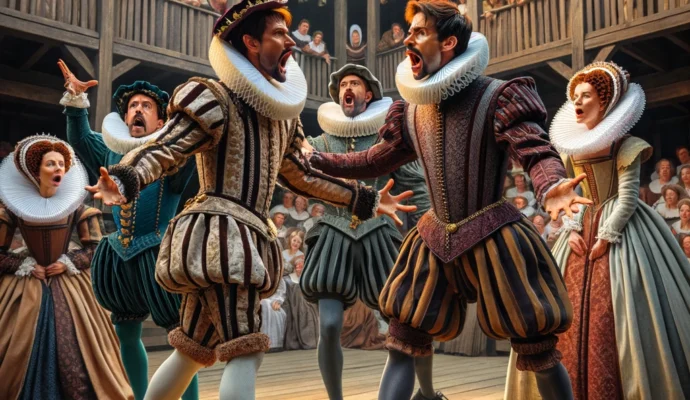Stepping Into the Spotlight
Imagine striding onto the creaky wooden stages of Tudor England, engulfed by the smell of an enthusiastic crowd less acquainted with the notion of daily baths. Back then, stepping into the role of an actor was like being a rock star, sans the electric guitar. Instead, your props were a ruffled collar and your voice, which had to carry without microphones, reaching every corner of the gathered throng.
A Men-Only Club

Here’s where things get spicy: the stage was a domain exclusively of men. Yes, even the roles of Juliet, Lady Macbeth, or any character of the fairer sex were portrayed by men. The mere suggestion of a woman taking to the stage was scandalous, a concept so alien it could ripple through the cobblestone streets of London, causing outright pandemonium.
Why the Disguise?
The all-male cast wasn’t just a whim but a reflection of the era’s stringent societal norms. The thought of women acting on stage was considered not just improper but downright scandalous. The practicalities also played a part — those elaborate costumes weren’t known for their breathability or ease of movement.
The Art of Transformation while acting in Tudor England
The Tudor actors were indeed the original masters of disguise. Picture a stout man, beard as thick as the densest hedge, suddenly paying a demure damsel. This transformation required immense skill: voice modulation to sound convincingly feminine, mastering delicate gestures, and the audience’s willing suspension of disbelief.
Craftsmanship Behind the Curtains
Diving deeper, the craftsmanship of costumes and stage effects deserves their own spotlight. Tailors and craftsmen worked with the fabrics and materials of the day to create outfits that could transform a burly actor into a believable woman. These costumes were not just garments but tools of the trade, essential for the illusion of the performance.
Societal Echoes and Cultural Impact
The tradition of all-male casts did more than just entertain; it mirrored and reinforced the gender roles and expectations of Tudor society. By keeping women off the stage, the theatre was a microcosm of the broader societal norms, where women’s roles were strictly defined and confined.
The Evolution of Theatre
Fast forward to today, and the legacy of Acting in Tudor England has evolved. Women have not only taken their rightful place on the stage but have also reshaped the theatre world in their image. The pioneering spirit of those early actors — their ability to convince, move, and occasionally bewilder — remains at the heart of acting.
A Final Thought
As we enjoy the rich diversity of modern theatre, it’s worth reflecting on those early days of Tudor performances. The actors of that era, with their flair for drama and transformation, laid the groundwork for the art form we cherish today. They remind us of the power of theatre to challenge, entertain, and reflect the human condition.
So, the next time you find yourself engrossed in a play, spare a thought for those trailblazers who braved the Tudor stages. Their legacy is not just in the roles they played but in their contribution to the evolution of theatre, from a men-only world to a inclusive art form.

